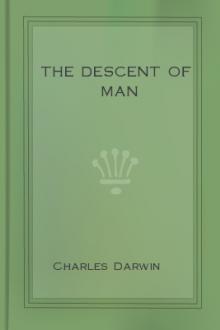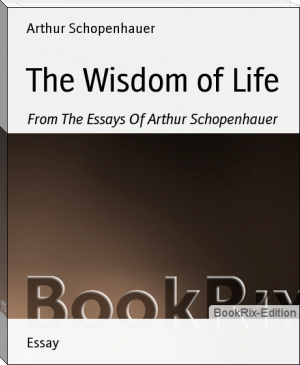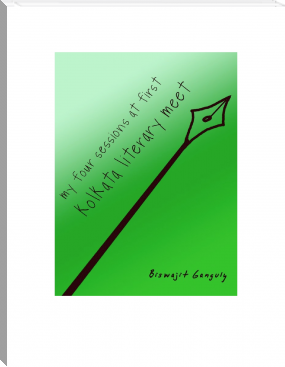The Art of Controversy - Arthur Schopenhauer (the reading strategies book txt) 📗

- Author: Arthur Schopenhauer
Book online «The Art of Controversy - Arthur Schopenhauer (the reading strategies book txt) 📗». Author Arthur Schopenhauer
must always try to preserve large views. If we are arrested by details we shall get confused, and see things awry. The success or the failure of the moment, and the impression that they make, should count for nothing.[1]
[Footnote 1: Translator's Note . - Schopenhauer, for some reason that is not apparent, wrote this remark in French.]
* * * * *
How difficult it is to learn to understand oneself, and clearly to recognise what it is that one wants before anything else; what it is, therefore, that is most immediately necessary to our happiness; then what comes next; and what takes the third and the fourth place, and so on.
Yet, without this knowledge, our life is planless, like a captain without a compass.
* * * * *
The sublime melancholy which leads us to cherish a lively conviction of the worthlessness of everything of all pleasures and of all mankind, and therefore to long for nothing, but to feel that life is merely a burden which must be borne to an end that cannot be very distant, is a much happier state of mind than any condition of desire, which, be it never so cheerful, would have us place a value on the illusions of the world, and strive to attain them.
This is a fact which we learn from experience; and it is clear, à priori , that one of these is a condition of illusion, and the other of knowledge.
Whether it is better to marry or not to marry is a question which in very many cases amounts to this: Are the cares of love more endurable than the anxieties of a livelihood?
* * * * *
Marriage is a trap which nature sets for us. [1]
[Footnote 1: Translator's Note . - Also in French.]
* * * * *
Poets and philosophers who are married men incur by that very fact the suspicion that they are looking to their own welfare, and not to the interests of science and art.
* * * * *
Habit is everything. Hence to be calm and unruffled is merely to anticipate a habit; and it is a great advantage not to need to form it.
* * * * *
"Personality is the element of the greatest happiness." Since pain and boredom are the two chief enemies of human happiness, nature has provided our personality with a protection against both. We can ward off pain, which is more often of the mind than of the body, by
cheerfulness ; and boredom by intelligence . But neither of these is akin to the other; nay, in any high degree they are perhaps incompatible. As Aristotle remarks, genius is allied to melancholy; and people of very cheerful disposition are only intelligent on the surface. The better, therefore, anyone is by nature armed against one of these evils, the worse, as a rule, is he armed against the other.
There is no human life that is free from pain and boredom; and it is a special favour on the part of fate if a man is chiefly exposed to the evil against which nature has armed him the better; if fate, that is, sends a great deal of pain where there is a very cheerful temper in which to bear it, and much leisure where there is much intelligence, but not vice versâ . For if a man is intelligent, he feels pain doubly or trebly; and a cheerful but unintellectual temper finds solitude and unoccupied leisure altogether unendurable.
* * * * *
In the sphere of thought, absurdity and perversity remain the masters of this world, and their dominion is suspended only for brief periods. Nor is it otherwise in art; for there genuine work, seldom found and still more seldom appreciated, is again and again driven out by dullness, insipidity, and affectation.
It is just the same in the sphere of action. Most men, says Bias, are bad. Virtue is a stranger in this world; and boundless egoism, cunning and malice, are always the order of the day. It is wrong to deceive the young on this point, for it will only make them feel later on that their teachers were the first to deceive them. If the object is to render the pupil a better man by telling him that others are excellent, it fails; and it would be more to the purpose to say: Most men are bad, it is for you to be better. In this way he would, at least, be sent out into the world armed with a shrewd foresight, instead of having to be convinced by bitter experience that his teachers were wrong.
All ignorance is dangerous, and most errors must be dearly paid. And good luck must he have that carries unchastised an error in his head unto his death.[1]
[Footnote 1: Translator's Note . - This, again, is Schopenhauer's own English.]
* * * * *
Every piece of success has a doubly beneficial effect upon us when, apart from the special and material advantage which it brings it is accompanied by the enlivening assurance that the world, fate, or the daemon within, does not mean so badly with us, nor is so opposed to our prosperity as we had fancied; when, in fine, it restores our courage to live.
Similarly, every misfortune or defeat has, in the contrary sense, an effect that is doubly depressing.
* * * * *
If we were not all of us exaggeratedly interested in ourselves, life would be so uninteresting that no one could endure it.
* * * * *
Everywhere in the world, and under all circumstances, it is only by force that anything can be done; but power is mostly in bad hands, because baseness is everywhere in a fearful majority.
* * * * *
Why should it be folly to be always intent on getting the greatest possible enjoyment out of the moment, which is our only sure possession? Our whole life is no more than a magnified present, and in itself as fleeting.
* * * * *
As a consequence of his individuality and the position in which he is placed, everyone without exception lives in a certain state of limitation, both as regards his ideas and the opinions which he forms. Another man is also limited, though not in the same way; but should he succeed in comprehending the other's limitation he can confuse and abash him, and put him to shame, by making him feel what his limitation is, even though the other be far and away his superior. Shrewd people often employ this circumstance to obtain a false and momentary advantage.
* * * * *
The only genuine superiority is that of the mind and character; all other kinds are fictitious, affected, false; and it is good to make them feel that it is so when they try to show off before the superiority that is true.[1]
[Footnote 1: Translator's Note . - In the original this also is in French.]
* * * * *
All the world's a stage,
And all the men and women merely players .
Exactly! Independently of what a man really is in himself, he has a part to play, which fate has imposed upon him from without, by determining his rank, education, and circumstances. The most immediate application of this truth appears to me to be that in life, as on the stage, we must distinguish between the actor and his part; distinguish, that is, the man in himself from his position and reputation - - from the part which rank and circumstances have imposed upon him. How often it is that the worst actor plays the king, and the best the beggar! This may happen in life, too; and a man must be very
crude to confuse the actor with his part.
* * * * *
Our life is so poor that none of the treasures of the world can make it rich; for the sources of enjoyment are soon found to be all very scanty, and it is in vain that we look for one that will always flow. Therefore, as regards our own welfare, there are only two ways in which we can use wealth. We can either spend it in ostentatious pomp, and feed on the cheap respect which our imaginary glory will bring us from the infatuated crowd; or, by avoiding all expenditure that will do us no good, we can let our wealth grow, so that we may have a bulwark against misfortune and want that shall be stronger and better every day; in view of the fact that life, though it has
[Footnote 1: Translator's Note . - Schopenhauer, for some reason that is not apparent, wrote this remark in French.]
* * * * *
How difficult it is to learn to understand oneself, and clearly to recognise what it is that one wants before anything else; what it is, therefore, that is most immediately necessary to our happiness; then what comes next; and what takes the third and the fourth place, and so on.
Yet, without this knowledge, our life is planless, like a captain without a compass.
* * * * *
The sublime melancholy which leads us to cherish a lively conviction of the worthlessness of everything of all pleasures and of all mankind, and therefore to long for nothing, but to feel that life is merely a burden which must be borne to an end that cannot be very distant, is a much happier state of mind than any condition of desire, which, be it never so cheerful, would have us place a value on the illusions of the world, and strive to attain them.
This is a fact which we learn from experience; and it is clear, à priori , that one of these is a condition of illusion, and the other of knowledge.
Whether it is better to marry or not to marry is a question which in very many cases amounts to this: Are the cares of love more endurable than the anxieties of a livelihood?
* * * * *
Marriage is a trap which nature sets for us. [1]
[Footnote 1: Translator's Note . - Also in French.]
* * * * *
Poets and philosophers who are married men incur by that very fact the suspicion that they are looking to their own welfare, and not to the interests of science and art.
* * * * *
Habit is everything. Hence to be calm and unruffled is merely to anticipate a habit; and it is a great advantage not to need to form it.
* * * * *
"Personality is the element of the greatest happiness." Since pain and boredom are the two chief enemies of human happiness, nature has provided our personality with a protection against both. We can ward off pain, which is more often of the mind than of the body, by
cheerfulness ; and boredom by intelligence . But neither of these is akin to the other; nay, in any high degree they are perhaps incompatible. As Aristotle remarks, genius is allied to melancholy; and people of very cheerful disposition are only intelligent on the surface. The better, therefore, anyone is by nature armed against one of these evils, the worse, as a rule, is he armed against the other.
There is no human life that is free from pain and boredom; and it is a special favour on the part of fate if a man is chiefly exposed to the evil against which nature has armed him the better; if fate, that is, sends a great deal of pain where there is a very cheerful temper in which to bear it, and much leisure where there is much intelligence, but not vice versâ . For if a man is intelligent, he feels pain doubly or trebly; and a cheerful but unintellectual temper finds solitude and unoccupied leisure altogether unendurable.
* * * * *
In the sphere of thought, absurdity and perversity remain the masters of this world, and their dominion is suspended only for brief periods. Nor is it otherwise in art; for there genuine work, seldom found and still more seldom appreciated, is again and again driven out by dullness, insipidity, and affectation.
It is just the same in the sphere of action. Most men, says Bias, are bad. Virtue is a stranger in this world; and boundless egoism, cunning and malice, are always the order of the day. It is wrong to deceive the young on this point, for it will only make them feel later on that their teachers were the first to deceive them. If the object is to render the pupil a better man by telling him that others are excellent, it fails; and it would be more to the purpose to say: Most men are bad, it is for you to be better. In this way he would, at least, be sent out into the world armed with a shrewd foresight, instead of having to be convinced by bitter experience that his teachers were wrong.
All ignorance is dangerous, and most errors must be dearly paid. And good luck must he have that carries unchastised an error in his head unto his death.[1]
[Footnote 1: Translator's Note . - This, again, is Schopenhauer's own English.]
* * * * *
Every piece of success has a doubly beneficial effect upon us when, apart from the special and material advantage which it brings it is accompanied by the enlivening assurance that the world, fate, or the daemon within, does not mean so badly with us, nor is so opposed to our prosperity as we had fancied; when, in fine, it restores our courage to live.
Similarly, every misfortune or defeat has, in the contrary sense, an effect that is doubly depressing.
* * * * *
If we were not all of us exaggeratedly interested in ourselves, life would be so uninteresting that no one could endure it.
* * * * *
Everywhere in the world, and under all circumstances, it is only by force that anything can be done; but power is mostly in bad hands, because baseness is everywhere in a fearful majority.
* * * * *
Why should it be folly to be always intent on getting the greatest possible enjoyment out of the moment, which is our only sure possession? Our whole life is no more than a magnified present, and in itself as fleeting.
* * * * *
As a consequence of his individuality and the position in which he is placed, everyone without exception lives in a certain state of limitation, both as regards his ideas and the opinions which he forms. Another man is also limited, though not in the same way; but should he succeed in comprehending the other's limitation he can confuse and abash him, and put him to shame, by making him feel what his limitation is, even though the other be far and away his superior. Shrewd people often employ this circumstance to obtain a false and momentary advantage.
* * * * *
The only genuine superiority is that of the mind and character; all other kinds are fictitious, affected, false; and it is good to make them feel that it is so when they try to show off before the superiority that is true.[1]
[Footnote 1: Translator's Note . - In the original this also is in French.]
* * * * *
All the world's a stage,
And all the men and women merely players .
Exactly! Independently of what a man really is in himself, he has a part to play, which fate has imposed upon him from without, by determining his rank, education, and circumstances. The most immediate application of this truth appears to me to be that in life, as on the stage, we must distinguish between the actor and his part; distinguish, that is, the man in himself from his position and reputation - - from the part which rank and circumstances have imposed upon him. How often it is that the worst actor plays the king, and the best the beggar! This may happen in life, too; and a man must be very
crude to confuse the actor with his part.
* * * * *
Our life is so poor that none of the treasures of the world can make it rich; for the sources of enjoyment are soon found to be all very scanty, and it is in vain that we look for one that will always flow. Therefore, as regards our own welfare, there are only two ways in which we can use wealth. We can either spend it in ostentatious pomp, and feed on the cheap respect which our imaginary glory will bring us from the infatuated crowd; or, by avoiding all expenditure that will do us no good, we can let our wealth grow, so that we may have a bulwark against misfortune and want that shall be stronger and better every day; in view of the fact that life, though it has
Free e-book «The Art of Controversy - Arthur Schopenhauer (the reading strategies book txt) 📗» - read online now
Similar e-books:





Comments (0)